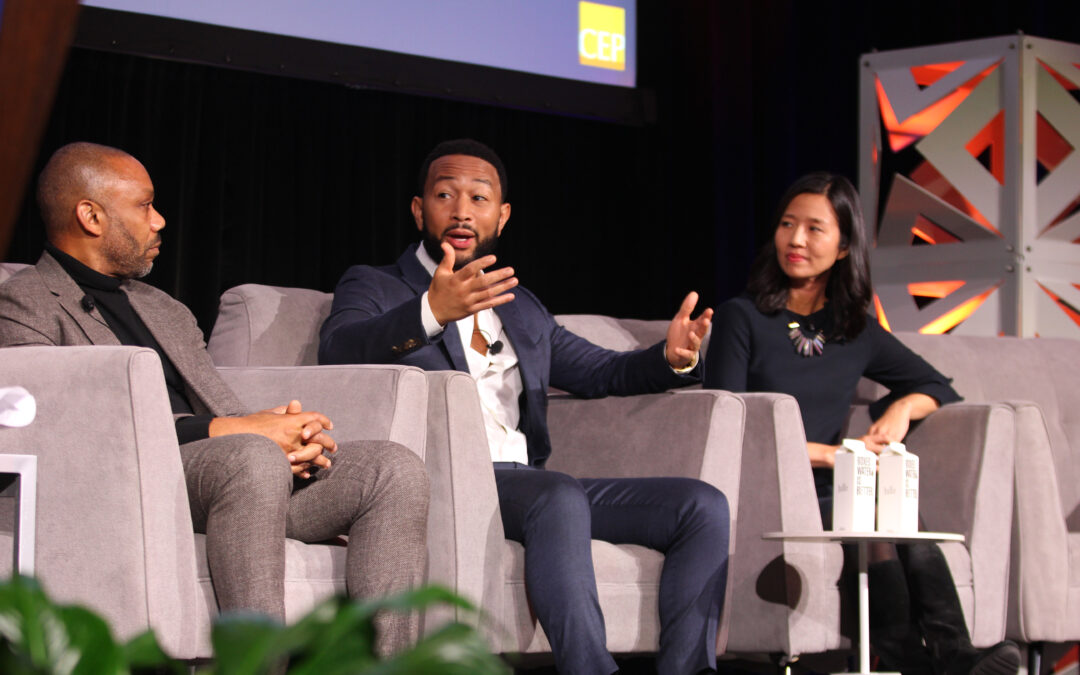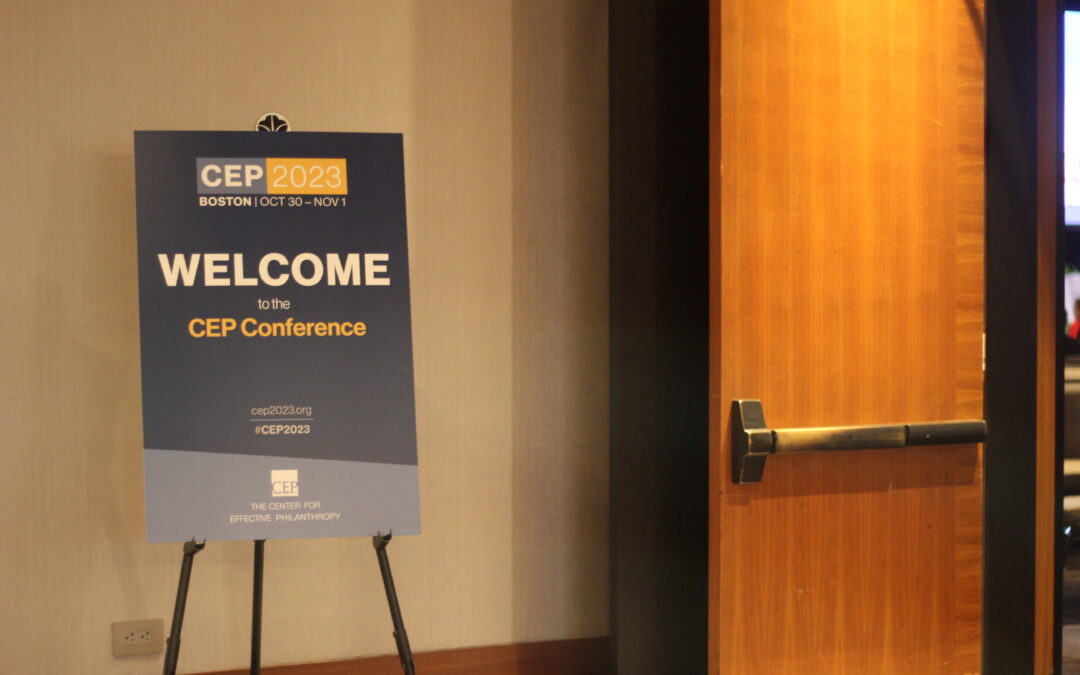Two days down, one to go here in Boston at Leading Effective Foundations, the 2017 CEP Conference! With an action-packed agenda, Day 2 covered a lot of ground and subject areas, from Phil Buchanan’s opening plenary sharing data and findings from recent CEP research, to insights from Doug Stone about receiving and giving feedback in a way that is helpful and productive, to a unique and dynamic one-woman performance from Tony Award-winner Sarah Jones to close out the night. Attendees also took part in the first series of breakout sessions of the conference, which included deeper dives on topics such as foundation culture and limited life philanthropy, to name a few.
Through tweets from attendees using hashtag #CEP2017, here is how Day 2 unfolded:
Following a kick-off to the day from Grace Nicolette, CEP’s vice president, programming and external relations, Jeff Poulos, executive director of Associated Grant Makers, welcomed attendees to the city of Boston, sharing some local flavor and history and adding an important regional grantmaking perspective about the critical role of philanthropy in the respective communities we each call home.
We're off and running for day 2! #cep2017 pic.twitter.com/RtgZgc2r97
— Center for Effective Philanthropy (@CEPData) April 5, 2017
"Appreciate the narrative of your region," says @jeffpoulos. "While we think globally, we also have to act locally." #cep2017
— Center for Effective Philanthropy (@CEPData) April 5, 2017
Poulos then welcomed CEP President Phil Buchanan to the stage for the morning’s first plenary, “Leading Effective Foundations in Complex, Changing Times.” Buchanan shared data from recently-published and yet-to-be-released CEP research about effectiveness, including a recent survey of foundation CEOs conducted earlier this year; findings from CEP’s recently-released report, The Future of Foundation Philanthropy; and a major study of program officers. Through this data, Buchanan raised important questions about topics such as how foundations are responding to the current context, how foundation leaders think they are doing when it comes to maximizing their impact, and what, from the grantee perspective, constitutes the most important determinants of an effective funder-grantee relationship. Interspersed with Buchanan’s presentation, attendees discussed in small groups, reacting to the data and sharing their own stories and experiences. Who says a 400-plus-person plenary can’t be interactive!
Listening to @philxbuchanan sharing @CEPData's new research #CEP2017 #philanthropy pic.twitter.com/Fea7UO2mGu
— Grace Chiang Nicolette (姜韻聲) (@GraceNicolette) April 5, 2017
"Strategy can't be yours alone, or it won't work." @philbuchanan #CEP2017
— Kathy Reich (@kdreich) April 5, 2017
https://twitter.com/nedgington/status/849618414779977728
#cep2017 More foundations are focusing on collaboration, convening and movement building in the current times. pic.twitter.com/2geaIdrl34
— Katherine Scott (@katiewscott) April 5, 2017
New @CEPData survey shows nearly half of foundations doing more policy, advocacy on state, local level post-election #CEP2017
— David Biemesderfer (@dbiemesderfer) April 5, 2017
Many foundations see opportunity even amid challenge, says @philxbuchanan #CEP2017
— Linda Baker (@Lindasbaker) April 5, 2017
3 issues that foundation CEOs identify as the most pressing in society: wealth and inequality, climate change, and education. #CEP2017 pic.twitter.com/eamJUfvVg0
— Center for Effective Philanthropy (@CEPData) April 5, 2017
Foundation CEOs say "wealth and inequality" is #1 most pressing issue for society and philanthropy – #cep2017
— Don Howard (@DonJHoward) April 5, 2017
When there is alignment of leadership, willingness, readiness, capacity & culture–the journey of change advances #CEP2017
— Debra Jacobs (@DebraMJacobs) April 5, 2017
Phil Buchanan reminding us that many barriers to improved foundation performance are internal, including "people stuff." #CEP2017
— Joanne Florino (@jfloithaca) April 5, 2017
Promising practices foundations can adopt to maximize their opportunity for impact #CEP2017 pic.twitter.com/R23pRXRQx7
— Ify Mora (@IfyMora) April 5, 2017
"Listening to grantees & those served by grantees" cited by foundation CEOs as essential to greater impact. Get out of the bubble! #CEP2017
— Joanne Florino (@jfloithaca) April 5, 2017
"Isn't your strategy going to be better when those you are seeking to help can tell you how it's playing out?" #beneficiaryfeedback #cep2017
— Center for Effective Philanthropy (@CEPData) April 5, 2017
Major issue for foundation ability to be responsive is governance. Don't focus so much on the docket. #roomlaughsknowingly #CEP2017
— Linda Baker (@Lindasbaker) April 5, 2017
Nonprofits are not foundation vendors. Amen, @philxbuchanan #cep2017
— Meghan Duffy (@meghanduffydc) April 5, 2017
https://twitter.com/Hayden_Couvi/status/849632771945496576
The best metaphor for the foundation/grantee relationship?
The foundation/grantee relationship.
— Linda Baker (@Lindasbaker) April 5, 2017
Two most important Drivers of good funder grantee relationships are 1) understanding & 2) transparency acc to @philxbuchanan #CEP2017
— Fay Twersky (@FayDTwersky) April 5, 2017
75℅ of program officers want to spend less time on internal administration. Excellent! Let's streamline together! #cep2017
— Michelle Greanias (@mgreanias) April 5, 2017
Best program officers listen. Truth. #CEP2017 #philanthropy @CEPData pic.twitter.com/cbm9qTUdJX
— Jim Canales (@jcanales) April 5, 2017
How it looks from the #cep2017 stage at an interactive 400-person plenary! Very cool to see the engagement. pic.twitter.com/n8VS6y4K4u
— Charis Loh (@CharisLoh) April 5, 2017
A 400-person plenary can be interactive! Table discussions at #cep2017 pic.twitter.com/kGLhMPx2eG
— Center for Effective Philanthropy (@CEPData) April 5, 2017
Change is possible. Things get better. Fdns have played an important part. Thanks for reminder @philxbuchanan #cep2017
— Alexa Culwell (@AlexaCulwell) April 5, 2017
https://twitter.com/twpollack/status/849637088861581313
After lunch, Doug Stone, author of the best-selling Thanks for the Feedback and Difficult Conversations, delivered an honest, humorous, and insightful plenary about the challenges of navigating feedback well — on both the giving and receiving ends — in our work and personal lives. Covering the different forms feedback takes, as well as the various ways in which feedback can trigger us to process it unproductively, Stone’s message has particular relevance for foundations as they seek to learn from feedback from those they work closely with in ways that will lead positively to growth and improvement.
Doug Stone now on the #cep2017 stage to talk feedback and difficult conversations. pic.twitter.com/pYsTwK7umH
— Center for Effective Philanthropy (@CEPData) April 5, 2017
"We're wired to want to learn and grow; at the same time we want to be accepted for who we are now." Doug Stone #cep2017
— Coach Terry Horton (@TerryHorton_) April 5, 2017
The most powerful lessons come from the most painful lessons. Receiving feedback can be tough. But that is how you learn. #CEP2017
— Linda Baker (@Lindasbaker) April 5, 2017
Do you give and receive all three kinds of feedback? #cep2017 pic.twitter.com/CZ742K75Vd
— Kathy Reich (@kdreich) April 5, 2017
Note to managers: appreciate your team; 93% of US workers say they feel unappreciated & most who leave say that why #cep2017 Doug Stone pic.twitter.com/hhuAWH9Fxy
— Stefan Lanfer (@stefanlanfer) April 5, 2017
Over 90 percent of American workers don't feel appreciated. How do we change that? #CEP2017 #feedback
— Hope Lyons (@hopelyons) April 5, 2017
There are many ways that someone can understand the true meaning behind feedback…😂Douglas Stone talk #cep2017 pic.twitter.com/eEvgIb0jZL
— Ify Mora (@IfyMora) April 5, 2017
Feedback inherently tricky because the giver can mean it one way & the receiver quite another. U need to be clearer than clear. #CEP2017
— Kathy Reich (@kdreich) April 5, 2017
Our trigger response when we hear feedback that challenges our core identity: AHHHHHHHH! #CEP2017
— Arum Lansel (@ArumLeeLansel) April 5, 2017
Power imbalances make feedback hard-a true blind spot for many fdns-it's why anonymous, 3rd party data key! #cep2017
— Alexa Culwell (@AlexaCulwell) April 5, 2017
Don't just ask, "What's your feedback?" Ask, "What's one thing that we can do differently that would help us improve?" – Doug Stone #cep2017
— Center for Effective Philanthropy (@CEPData) April 5, 2017
How to respond to feedback without sounding defensive? Recognize and share each person's perspective – Doug Stone #cep2017
— Ify Mora (@IfyMora) April 5, 2017
In back-to-back slates of breakout sessions, attendees then came together in smaller settings for panels and conversations focused on various topics, including, among others, purpose-built design in philanthropic projects, listening better to beneficiaries, evaluation, and nonprofit scale. Check out a smattering of tweets from attendees of various sessions throughout the day:
A+ panel on Strategic Alliances & Restructuring for Greater Impact-what is the Funder role? #CEP2017 #collaboration pic.twitter.com/dF1984VHm2
— Debra Jacobs (@DebraMJacobs) April 5, 2017
"Architecture is never neutral. It either helps or it hurts." @MassDesignLab on how buildings can amplify social change. #cep2017
— Atlantic (@atlantic) April 5, 2017
"Non-profits, aspire to scale your impact, not your organization." #CEP2017
— Kathy Reich (@kdreich) April 5, 2017
@youthfirstinc – remarkable state-by-state policy advocacy approach! #unotroforma @LetiPeguero #cep2017 @SchottFound pic.twitter.com/AIgqLPhzHR
— Heidi Brooks (@cinnamonboston) April 5, 2017
Invest in relationship building before jumping into creating the action plan. Beginnings happen once. #CEP2017
— Debra Jacobs (@DebraMJacobs) April 5, 2017
https://twitter.com/twpollack/status/849706098290552835
Creative network maps panel at #CEP2017 conference uncovers who is doing what and who is funding it in oceans, youth#philanthropy and media pic.twitter.com/gmcC2rftRG
— Crystal Hayling (@CHayling) April 6, 2017
We need to shift our frameworks to have better difficult conversations says Doug Stone #CEP2017 pic.twitter.com/rH3xErqsPW
— Grace Chiang Nicolette (姜韻聲) (@GraceNicolette) April 5, 2017
stimulating to hear about how philanthropy is reacting to the Trump presidency. One point: work at state & community level is key. #cep2017
— James Knickman (@JimKnickman) April 5, 2017
Observation by @kmbolduc Fdn culture key to grantee relationships but only possible if fdn staff have time to focus on culture #cep2017
— Michelle Greanias (@mgreanias) April 5, 2017
“Culture is a critical strategy for large-scale change.” @AmyCelep #cep2017 pic.twitter.com/pz5Q04Bbl7
— Community Wealth Partners (@WeDreamForward) April 5, 2017
.@kmbolduc, @AmyCelep, and Ann Stern discuss change-making culture at foundations #cep2017 pic.twitter.com/sKfH00Rp6w
— Center for Effective Philanthropy (@CEPData) April 5, 2017
https://twitter.com/twpollack/status/849725376733618177
To make #evaluation useful, ask grantees and community members what they need to know #CEP2017
— Meghan Duffy (@meghanduffydc) April 5, 2017
Marc Holley @WaltonFamilyFdn reminding us that context matters and there is no one way to conduct evaluation. Repeat. #CEP2017
— Jara Dean-Coffey (she/her/hers) (@jdeancoffey) April 5, 2017
One thing that limited-life and perpetual fdns have in common–both are regularly entering and exiting relationships with grantees. #CEP2017
— Atlantic (@atlantic) April 5, 2017
Experts from @atlantic, Lenfest Fdn, and S.D. Bechtel Jr., Fdn discuss lessons from time-limited philanthropy! #cep2017 pic.twitter.com/MFbUGg1gmB
— Charis Loh (@CharisLoh) April 5, 2017
@lindsaylouie: To scale, organizations must have solid financial footing and can't be squeezed on overhead/indirects. #fullcosts #cep2017
— Linda Baker (@Lindasbaker) April 5, 2017
To close the day, the arts took center stage in the grand ballroom, starting with a performance from 19-year-old violist Mira Williams, a student at the New England Conservatory of Music. Williams is part of From the Top, a Boston-based nonprofit that empowers young people to engage and inspire music lovers of all ages. Following an introduction and interview with Media Impact Funders Executive Director Vince Stehle, Williams delivered a lovely piece with a piano accompaniment (see video below).
Thank you, @CEPData, for integrating the arts into your conference by featuring @classicalkid at #cep2017 pic.twitter.com/SVv6ueA3ed
— Jim Canales (@jcanales) April 5, 2017
What a beautiful performance! #cep2017 pic.twitter.com/P9jXRklFwJ
— Ify Mora (@IfyMora) April 5, 2017
First time this has happened at a #philanthropy conference… #cep2017 https://t.co/2kkgGl0BSq
— Stefan Lanfer (@stefanlanfer) April 5, 2017
Following Williams’ performance, CEP Board Member Fay Twersky of the William and Flora Hewlett Foundation welcomed performer and playwright Sarah Jones to the stage for a piece that the audience will not soon forget. Jones delivered a stunning one-woman performance, titled “The Foundation,” in which she took on the identities of several diverse characters to hold up a mirror to foundations. Playing out a meeting with board members and grantees, Jones illuminated the interplay between the different perspectives and ideas at play in philanthropy. It was only the second time Jones had performed the piece and it provided an engrossing, thought-provoking, and often times humorous conclusion to Day 2.
.@jonesarah performs "The Foundation" at #CEP2017. I've been waiting all day for this! Spot on.
— Gwen Walden 🇺🇸 🏳️🌈 (@WaldenPhil) April 6, 2017
https://twitter.com/KateWolford/status/849784629838196738
And of course, long live the Oxford Comma.
At #CEP2017, glad to see Oxford Comma used in program booklet. #oxfordcommaforever pic.twitter.com/hLs8v3zNTM
— Vu Le (with one E) (@NonprofitAF) April 5, 2017


